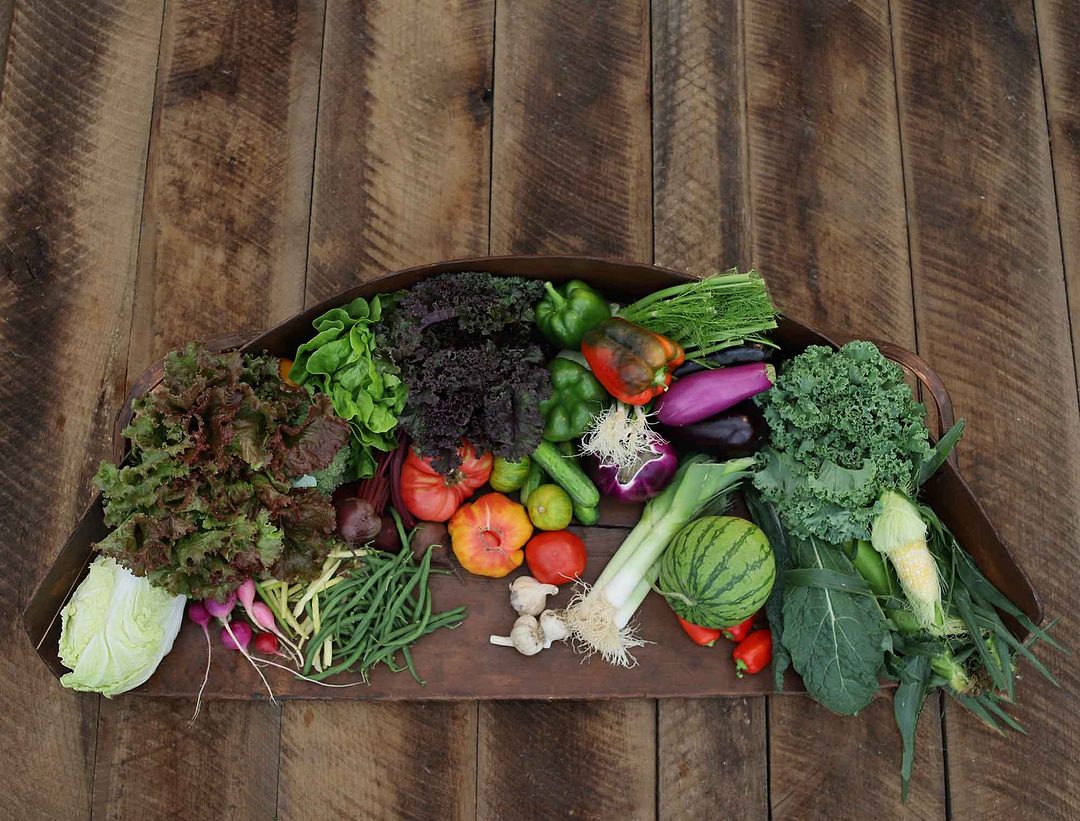Farming has been an institution in Concord and Carlisle for centuries. As early as 1775, Concord was a busy hub of trade partly because of its access to Boston but also given the topography of land and climate agreeable to farming. This tradition continues today, with approximately 812 acres of working farmland between the two towns. Community supported agriculture (CSA) is an integral part of these farms, ensuring the farmers a sustainable source of funding and providing residents with fresh, healthy produce spring through fall. In a CSA, residents purchase a ‘subscription’ for produce or other farm products that can then be picked up as they are harvested. CSAs are very popular in the Concord area and tend to sell out quickly.
Jen Verrill of Verrill Farm noted that they have three types of CSA plans; a full (weekly) CSA share offering 12-20+ items/week, a bi-weekly CSA share, and a speedy CSA share providing 8-12 items per week. If you select speedy share you receive a pre-packed bag of produce delivered right to your car for contactless service. In addition, due to COVID restrictions, Verrill Farm is adding a second day for market-style pick up of CSA baskets as well as a second tent for gathering your produce, which will allow for social distancing. Jen mentioned that one of the reasons she enjoys her work is due to the CSA members. She smiles when hearing them share recipes using produce picked up that week or enjoying the chance to see friends, even at a distance. “Pick-up day is my favorite day of the week, not only for the fresh produce but to connect with my good friends.” is a sentiment that Jen overhears often. For more information visit verrillfarm.com.

A new twist at Clark Farm is the opportunity to pick your own! Andrew Rodgers, the farm manager, changed how their CSA worked in response to COVID restrictions. He found that opening the fields to CSA members and extending the hours has many advantages. “I found that members were enjoying the activity of harvesting their share and then lingering to enjoy the vistas, fresh air, and simply being outdoors.” The longer hours afforded many the flexibility to pick early or late depending on their schedules. In addition to the mainstays of produce, Rodgers and his team have ventured into planting some unusual produce which has been a delight to many. Green luobo radish, Mexican sour gherkins, dragon beans, Indian spinach, and bitter melon are just a few items that have brought back childhood foodie memories for some members. They are unearthing recipes and tossing in these hard-to-find ingredients. For hours and additional information go to their website clarkfarmcarlisle.com.
Can a farm be a hidden jewel and a mainstay at the same time? Now in its eighth year, Barrett’s Mill Farm is just that — a key part of the food fabric in Concord. Continually reinventing and adapting, they have accommodated the COVID rules by adding canopy tents to the farm stand area, increasing the open-air space for all customers. One part of their CSA process involves farm stand selection, and the second part is pick-your-own in every CSA pick up. When you come to the farm during your scheduled time for pick up, a list of produce available is written on a clipboard near the tents and each member selects approximately 16 bulk items, then they head out to the farm to pick specified items from the fields. This two-fold approach allows for more people to participate because they are spaced out. Melissa Maxwell, one of the co-owners, shares that there are now three CSA options; regular 20 weeks, extended 24 weeks, and flexible - where you pick up 20 weeks out of the 24 offered, providing flexibility for your schedule. Their CSA farm stand is on target to be fully stocked and ready to go. CSA members can even call ahead to order and it can be delivered to your car, providing contactless service. For more information visit barrettsmillfarm.com.

Fresh tomatoes at Barrett’s Mill Farm
| ©Barrett’s Mill Farm———————————————————————————
The concept of community supported agriculture (CSA) began in Massachusetts in 1986. Jan Vander Tuin, Susan Witt, and Robyn Van En were the early innovators of the idea, working to ensure farmers could co-exist with steadily increasing national and international competition. Recently, when talking with Susan Witt, she shared that the transition from farmer to community-financed farming was a pivotal shift in philosophy, enabling many farms to continue and prosper in the face of expanding competition. She and her two business partners founded Indian Line Farm to create “exuberant episodes of import replacement.” They focused on ensuring that small-scale, economically and environmentally sustainable agriculture could thrive locally.
It all began when Susan was the treasurer of a food group buying club. While paying the bills, she found that storage carrots, squash, and garlic were coming in bulk from California to the Berkshires in Massachusetts where she lived. Susan put an ad in the local paper to see if any farms could fill their co-op order locally and, voila, partnerships began and local farmers sourced their orders. Over the years as the affordability of farm ownership became challenging, she and her partners mapped a plan for farm adaptability; a partnership between farm, farmer, and community. The plan uses a simple method of matching community support and financing for small, locally operated farms. Committed consumers buy shares with the guarantee of a regular, sustained parcel of produce from the growing season… and just like that CSAs took off. Today there are more than 20,500 CSAs in the country.


